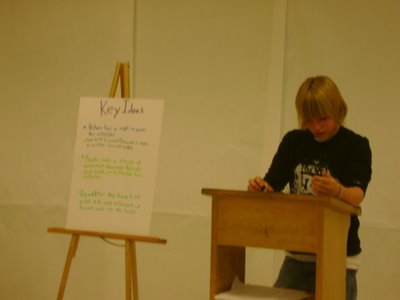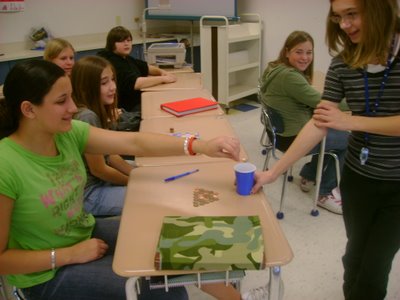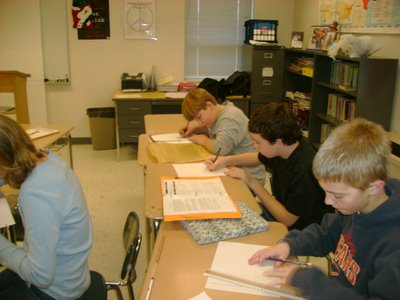In honor of Mrs. Cook, I am posting some classic holiday videos. Enjoy!
Thursday, December 21, 2006
Monday, December 18, 2006
Declaration of Indepence, Illustrated Children's Versions
Wednesday, December 13, 2006
The Declaration of Independence
Here is a video of the Declaration of Indpendence being read by a number of well known celebrities with an introduction by Morgan Freeman:
And here is Sesame Street's take on the writing of the Declaration:
And here is Sesame Street's take on the writing of the Declaration:
Tuesday, December 12, 2006
Extra Credit: 1776
In the movie 1776, delegate Caesar Rodney of Delaware is portrayed as being very sick during the debate on Independence. So sick that he went home to Delaware so that he might die in his own bed, only to be brought back to Philadelphia so that he could cast a tie breaking vote, within his delegation, in order to make sure that Delaware voted for Independence.
While Rodney did suffer from skin cancer during much of his adulthood, that is not the reason he had to leave Philadelphia in June of 1776. He was in Delaware in order to stop Loyalist activity there, when he recieved word that the Delaware delegation was deadlocked on the issue of independence. To break that deadlock, Rodney rode eighty miles through a thunderstorm on the night of July 1, 1776, dramatically arriving in Philadelphia "in his boots and spurs" just as the voting was beginning.
Here is the extra credit opportunity:
I am looking for a picture of Caesar Rodney on his horseride back to Philadelphia. It is a very specific picture, one that you have probably had in your possesion before without even knowing it. In fact, you might have a copy of it in your house right now.
The first person to bring me this picture will recieve 25 points extra credit (there is another clue in this sentence).
Each person after that will recieve 10 points extra credit.
I will be accepting these up until Friday.
While Rodney did suffer from skin cancer during much of his adulthood, that is not the reason he had to leave Philadelphia in June of 1776. He was in Delaware in order to stop Loyalist activity there, when he recieved word that the Delaware delegation was deadlocked on the issue of independence. To break that deadlock, Rodney rode eighty miles through a thunderstorm on the night of July 1, 1776, dramatically arriving in Philadelphia "in his boots and spurs" just as the voting was beginning.
Here is the extra credit opportunity:
I am looking for a picture of Caesar Rodney on his horseride back to Philadelphia. It is a very specific picture, one that you have probably had in your possesion before without even knowing it. In fact, you might have a copy of it in your house right now.
The first person to bring me this picture will recieve 25 points extra credit (there is another clue in this sentence).
Each person after that will recieve 10 points extra credit.
I will be accepting these up until Friday.
Sunday, December 10, 2006
1776
We are currently watching the movie 1776, a musical about the Second Continental Congress and the debate on idependence. I was able to find video on the web of some of my favorite scenes. Below is one of the first scenes in the movie, it shows how many of the other delegates did not care much for John Adams. They disliked him for his ego, and the way that he always voiced his opinions so strongly. Because of this, Adams had a hard time getting Congress to even talk about the issue of independence from Great Britain , until it was proposed by a more well-liked delegate.
Monday, December 04, 2006
Founding Fathers League
We are about to begin our study of the Declaration of Independence and the American Revolution. In honor of the famous men who were involved in these events, I am posting this video I found that introduces the "Founding Fathers" using the theme of the Justice League.
Wednesday, November 29, 2006
Colonial Town Meeting
On Nov. 27 and 28th we held a Colonial Town Meeting in order to better understand the debate over colonial independence in early 1776. Students were each assigned a specific historical figure. They were given a description of that person's view on independence and were told whether they were a Patriot, a Loyalist, or if they were Neutral at that time. Each student had to create a poster they would use to present their "Key Ideas" at the Town Meeting
The Patriots and Loyalists switched off presenting their ideas to the Neutralists. After each presentation, Neutralists were given the opportunity to question the presenter, and the opposing side was given an opportunity for rebuttal.
The students really liked this activity and most of them did a good job of representing their side. Many students got into their character, which sometimes led to a heated, but good spirited, debate.
At the end of the meeting, the Neutralists had to declare whenter they would side with the Patriots or Loyalists.



The Patriots and Loyalists switched off presenting their ideas to the Neutralists. After each presentation, Neutralists were given the opportunity to question the presenter, and the opposing side was given an opportunity for rebuttal.
The students really liked this activity and most of them did a good job of representing their side. Many students got into their character, which sometimes led to a heated, but good spirited, debate.
At the end of the meeting, the Neutralists had to declare whenter they would side with the Patriots or Loyalists.






Monday, November 20, 2006
History of Thanksgiving
History Channel: Desperate Crossing
The History Channel (usually ch 74 in the Harbor) has a cool new special this month about the Mayflower and how the people journeyed on it both flourished, and failed, in the "New World." I highly recommend that you check it out. View a preview of it here:
Wednesday, November 15, 2006
Extra Credit: The Boston Massacre
Below are two very different depictions of what took place at the scene of the Boston Massacre. they are written from two very different points of view. One of them is from a Patriot's point of view, the other is more likely from a British, or neutral, point of view. Using what we have learned in class (section 5.5 in your textbook), try and determine which is which. For extra credit, write up a brief statement (2 paragraphs) that explains which picture was drawn from which point of view. Your explanation must be supported with details from what we have read/discussed in class.
This statement must be neatly written on lined notebook paper, with correct spelling, grammar and punctuation. It must be turned in to me by Monday, Nov. 27th to get the extra credit.
Illustration 1:

This statement must be neatly written on lined notebook paper, with correct spelling, grammar and punctuation. It must be turned in to me by Monday, Nov. 27th to get the extra credit.
Illustration 1:

Illustration 2:

Friday, November 10, 2006
Taxation Without Representation
On Thursday, students participated in a history simulation in which most of them played the role of colonists being taxed by the "King" and "Parliament". The "Colonists" were taxed on things such as hair color, clothing, and accesories. The "Colonists" had no say in the taxes and, though they were not happy about it, the "King" and "Parliament" kept demanding more money.
Colonists had a hard time parting with their hard earned money Parliament, the King, and the Tax Collectors discuss whether or not they have collected enough from the Colonists:
Parliament, the King, and the Tax Collectors discuss whether or not they have collected enough from the Colonists:

Colonists had a hard time parting with their hard earned money
 Parliament, the King, and the Tax Collectors discuss whether or not they have collected enough from the Colonists:
Parliament, the King, and the Tax Collectors discuss whether or not they have collected enough from the Colonists:
The King and Parliament definitely enjoyed seeing the money roll in: The Colonists were not very happy with the Tax Collectors
The Colonists were not very happy with the Tax Collectors
Thursday, October 19, 2006
Colonial Travel Fair Part 1
The Colonial Travel Fair was a big success! Here are some pictures of the morning classes.














Monday, October 16, 2006
My Pumpkins
Here are the pumpkins I carved for Halloween this year. If you can't tell just by looking at them, the first one is Abraham Lincoln and the second one is George Washington.




Friday, October 13, 2006
Preparing for Our Colonial Travel Fair
As part of our study of the 13 English Colonies in America, students are currently working on preparations for our Colonial Travel Fair. The fair will have several booths designed to entice others to move to their colony.
The Fair will be held on Wednesday Oct. 18th in the North Prairie library. The morning Social Studies classes will be presening their booths between 9:40 and 11:00. The afternoon classes will present theirs between 1:30 and 3:00. Parents and family members are welcome to come check it out (make sure you check with your student to find out when they have social studies class).



The Fair will be held on Wednesday Oct. 18th in the North Prairie library. The morning Social Studies classes will be presening their booths between 9:40 and 11:00. The afternoon classes will present theirs between 1:30 and 3:00. Parents and family members are welcome to come check it out (make sure you check with your student to find out when they have social studies class).



Friday, October 06, 2006
The Mayflower
Below are some videos I found of a re-creation of the original Mayflower ship. Notice how small it actually was.
Friday, September 29, 2006
Ferdinand Magellan

Ferdinand Magellan was a Portugese sailor who led the first successful expedition to sail around the world. While other explorers were looking for water routes through North and South America, Magellan led his team south around the tip of South America. Magellan was killed in a battle with natives in the Phillipines, but one of
his five ships eventually made it back to Spain.

Here's a fun video about Magellan:
Tuesday, September 26, 2006
New Netherlands Act-It-Out
Our final act-it-out for Unit 2: European Exploration and Settlement, was on the surrender of New Amsterdam to the English.
 One student from each class portrayed the colony's Dutch governor Peter "Peg Leg Pete" Stuyvesant, while others played the roles of Dutch colonists trying to persuade him to surrender (as usual, I played the on-the-scene reporter).
One student from each class portrayed the colony's Dutch governor Peter "Peg Leg Pete" Stuyvesant, while others played the roles of Dutch colonists trying to persuade him to surrender (as usual, I played the on-the-scene reporter).
 Governor Stuyvesant was prepared to defend his colony, until he was informed that his supply of gun powder was damp and useless. Without a shot being fired, New Amsterdam was handed over to the British who renamed the colony New York.
Governor Stuyvesant was prepared to defend his colony, until he was informed that his supply of gun powder was damp and useless. Without a shot being fired, New Amsterdam was handed over to the British who renamed the colony New York.

 One student from each class portrayed the colony's Dutch governor Peter "Peg Leg Pete" Stuyvesant, while others played the roles of Dutch colonists trying to persuade him to surrender (as usual, I played the on-the-scene reporter).
One student from each class portrayed the colony's Dutch governor Peter "Peg Leg Pete" Stuyvesant, while others played the roles of Dutch colonists trying to persuade him to surrender (as usual, I played the on-the-scene reporter). Governor Stuyvesant was prepared to defend his colony, until he was informed that his supply of gun powder was damp and useless. Without a shot being fired, New Amsterdam was handed over to the British who renamed the colony New York.
Governor Stuyvesant was prepared to defend his colony, until he was informed that his supply of gun powder was damp and useless. Without a shot being fired, New Amsterdam was handed over to the British who renamed the colony New York.
Monday, September 25, 2006
The True Story of Pocahontas

In our discussion of jamestown last week we briefly
touched upon the importance of Pocahontas. I
mentioned how the Disney movie is not an accurate
depiction, but I was not able to go into much detail.
Here is a link to the the true story of Pocahontas
Thursday, September 21, 2006
Act-It-Out: New France
Sept. 20th, 2006
We are currently learning about how European countries claimed and settled lands in the "New World." We have been creating "act-it-outs" to help us better understand what the settlers and Native Americans went through.
In the New France "act-it-out", students were chosen to portray French fur trappers settling in what's now Canada, Huron Indians (allies of the French), or Iriquois Indians (enemies of the French and Huron).


We are currently learning about how European countries claimed and settled lands in the "New World." We have been creating "act-it-outs" to help us better understand what the settlers and Native Americans went through.
In the New France "act-it-out", students were chosen to portray French fur trappers settling in what's now Canada, Huron Indians (allies of the French), or Iriquois Indians (enemies of the French and Huron).



Blind Passage
Sept. 12, 2006
As our Preview for Unit 2: European Exploration and Settlement, students participated in an activity called Blind Passage. In this activity, students would have to walk through a field of obstacles, blindfolded, in order to earn extra credit for their team.
After the activity, we compared what the students did with what early European explorers experienced in their search for new trade routes.
 After the activity, we compared what the students experienced with what early European explorers went through while searching for new trade routes. We discussed their goals, challenges, risks vs. rewards, and the role that competition played.
After the activity, we compared what the students experienced with what early European explorers went through while searching for new trade routes. We discussed their goals, challenges, risks vs. rewards, and the role that competition played.
As our Preview for Unit 2: European Exploration and Settlement, students participated in an activity called Blind Passage. In this activity, students would have to walk through a field of obstacles, blindfolded, in order to earn extra credit for their team.
After the activity, we compared what the students did with what early European explorers experienced in their search for new trade routes.

 After the activity, we compared what the students experienced with what early European explorers went through while searching for new trade routes. We discussed their goals, challenges, risks vs. rewards, and the role that competition played.
After the activity, we compared what the students experienced with what early European explorers went through while searching for new trade routes. We discussed their goals, challenges, risks vs. rewards, and the role that competition played.
Subscribe to:
Posts (Atom)












